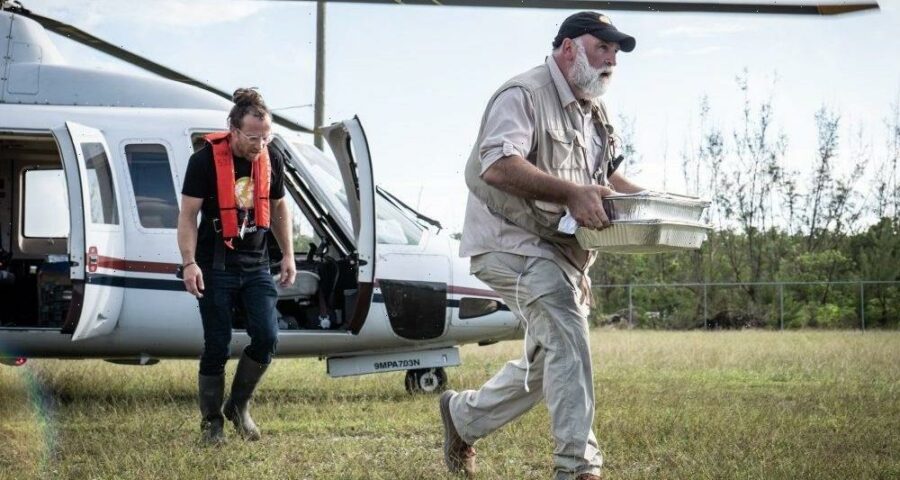After spending 90 minutes watching major league celebrity chef Jose Andres hustling to deliver food to desperate people in far-flung corners of the globe, it’s almost shocking to see him being tripped up simply because his little plane has run out of gas. By this time, you believe that this guy could just keep running on fumes indefinitely.
Ron Howard’s brisk National Geographic Films documentary puts you right in the planes, trucks, and kitchens to witness how one passionate man’s devotion to food in all its manifestations morphed into a new international enterprise to help the poor in desperate straits.
A very busy guy in media for 63 years now, Howard has directed eight documentaries (as well as five dramatic features) over the past decade. In Andres, he has a very attention-getting camera subject, a larger-than-life Spaniard who, at a very young age, moved to the United States, put tapas on the American culinary map, opened a raft of trendy restaurants, and most notably created the World Central Kitchen, a nonprofit humanitarian aid organization devoted to delivering food relief to the needy in crisis situations.
Related Story
'X' Film Review: Director Ti West Delivers A Love Letter To Slasher Cinema
There’s hardly a scene in this always-on-the-move film that doesn’t involve Andres and/or some of his associates jumping into helicopters or other vehicles, then wading through floods and mud and detritus-strewn disaster areas while arranging for nutrition to somehow get delivered desperate populations. And what they’re providing aren’t K-rations—it actually looks good to eat.
“I cook and I feed,” is Andres’ credo, one that embraces his high-end restaurants such as Jaleo, China Chilcano, and Zaytinya, as well as whatever he can find to rush off to the needy at a moment’s notice. How it all works from an organizational perspective remains somewhat unclear. But the evidence onscreen shows that Andres’ determination, boundless energy, and instinct to ignore or tear through red tape have carried the day with results that are genuinely inspiring.
“Enthusiasm is something I don’t lack,” Andres immodestly confesses, and it’s a trait we see from the outset, with his wife, three daughters, and son, as well as in the quick account of his swift rise to the culinary heights in the early 1990s. It didn’t take him long at all to become a brand. Large in physique as well as personality, he easily dominates wherever he goes, from high-end kitchens to disaster areas where low-income and suddenly homeless populations need immediate help, often in countries and areas poorly equipped to provide it.
Starting it all was the Haiti earthquake of 2010. Andres was on the Cayman Islands at the time, and after watching the devastation on TV, he made his way to Port-au-Prince, where he cooked local food for the stranded and homeless. When Hurricane Maria hit Puerto Rico in 2017, he was there three days later and helped distribute army-style food; the following year, he got involved again when huge flooding struck Wilmington, North Carolina. Name chefs were never generally associated with such relief efforts, but when Andres stepped up, people noticed.
A brief pause between disasters allows a quick insight into what brought the man here: His parents were nurses in Spain, and the boy spent a good deal of his youth in hospitals and emergency rooms. In the bargain, his father loved to cook, and by the time the kid left home, at 16, he already knew his way around a kitchen quite well.
How the organization, fundraising, and basic logistics are managed remain rather fuzzy in this account, which prefers, whenever possible, to put the spotlight on the ever-active star, which he undeniably is. He seems to turn up everywhere and at any time—in Guatemala after a big earthquake there in 2018, the following year after the dreadful Hurricane Dorian in the Bahamas; in the Navajo Nation, which at one time had the highest Covid-19 infection rate in the country; in California’s Central Valley, Oakland, and even New York City, where at one point the organization was providing 92,000 meals per day, and even in Washington, D.C. itself, at the DC Central Kitchen. It would have been interesting to show how the organization made that possible.
The film could have provided a clearer and more comprehensive account of how the program is financed, staffed, and prioritized in terms of its functions. But without question, it tells an inspiring story on behalf a cause whose value is inarguably of the utmost impotance.
Must Read Stories
Johnny Depp-Amber Heard Trial To Call Franco, Bettany, Musk & Others As Witnesses
‘The Batman’ Rising To $300M, ‘Jujutsu Kaisen 0’ At $19M
Amazon Sets Interim Structure For Top MGM Execs; Town Halls Rally Troops
Notes On The Season: Oscar Voting Starts As Final Guilds Loom; ‘CODA’ French Kiss
Read More About:
Source: Read Full Article





